The FTSE 100 made modest gains on Monday as investors digested a high‑profile diplomatic meeting in Washington and waited for fresh signals from central bankers. According to market reports, the blue‑chip index closed up 18.84 points, or 0.2%, at 9,157.74, while the FTSE 250 and AIM showed only marginal moves as traders balanced geopolitical uncertainty with pockets of UK‑specific corporate news. Market commentary reproduced by Morningstar noted the summit between US and European leaders and Ukraine’s president as a key backdrop to sentiment.
The Washington gathering — described by Reuters as a follow‑up to last week’s bilateral summit between President Donald Trump and President Vladimir Putin in Alaska — was dominated by discussions of security guarantees and potential arms purchases for Ukraine. Reuters reported that Mr Trump told Volodymyr Zelenskiy the United States would help assure Ukraine’s security as part of any eventual peace settlement, but the meeting underlined persistent differences over ceasefires, territorial demands and the shape of any final agreement. That assessment echoed Al Jazeera’s analysis of the Alaska encounter, which concluded no concrete ceasefire or deal emerged from the shorter‑than‑expected talks with President Putin.
Against that fraught diplomatic backdrop, investors stayed focused on the mechanics of markets. European bourses were mixed — Paris’s CAC 40 fell while Frankfurt’s DAX closed marginally lower — and US indices showed only slight moves, with the Dow slightly firmer as the S&P 500 and Nasdaq slipped. Currency and bond markets reflected the same ambivalence: sterling eased against the dollar, the euro dipped, and the US 10‑year Treasury yield rose a few basis points. Those movements were reported alongside the headline UK and international equity numbers in the original market coverage.
A further source of market attention this week is Federal Reserve Chair Jerome Powell’s speech at the Jackson Hole symposium. Reuters set out the tension Powell faces between stubborn inflation readings and signs of softening in the labour market, and noted that while past Jackson Hole addresses have sometimes clarified policy, they have not always broken new ground. Market participants cited by the market reports warned not to expect a clear pivot to easing next month; some banks have argued Powell is unlikely to firmly guide markets toward a cut at the immediate meeting.
Defence and security names led gains on the FTSE as investors priced in continued geopolitical risk. Babcock International jumped after RBC Capital Markets initiated coverage with an “outperform” rating and a 1,200p price target, a broker note picked up in the market commentary said, and BAE Systems also rose. Analysts and strategists cited in the coverage suggested that uncertainty over the Ukraine conflict had lifted demand expectations for defence contractors, though such moves were described in the market note rather than presented as guarantees of sustained earnings upgrades.
On the domestic corporate front, Dr Martens was a standout in the mid‑cap index after Peel Hunt upgraded the retailer to “buy”, saying new management appeared to be making progress. Close Brothers, by contrast, led FTSE 250 fallers after RBC downgraded the stock following its post‑ruling rally. In smaller‑cap trading, oil and gas explorer Pantheon Resources reported appraisal results from Alaska that the company said exceeded pre‑drill expectations; the firm’s regulatory filing recorded a pilot hole drilled to a measured depth of 12,833 feet and a thicker‑than‑expected hydrocarbon column in its primary target. The company described the results as a success in its RNS, while commentators cautioned that appraisal findings require further testing and development planning before being treated as definitive production forecasts.
Commodity markets were steady to softer: Brent crude traded slightly lower than on Friday and gold eased from its recent levels, reflecting the mix of safe‑haven flows, oil supply dynamics and investor positioning influenced by the diplomatic developments and central‑bank calendar. Those price moves were included in the market closing reports summarising the day’s activity.
Closer to home, UK household mood showed a modest lift in August. S&P Global Market Intelligence’s consumer sentiment index rose to 47.0 from 45.1 in July — still below the neutral 50 threshold but the strongest reading since last October — and S&P Global’s economist Maryam Baluch told S&P Global that the data collection began shortly after the Bank of England’s rate cut, providing “a timely snapshot” of sentiment in the wake of monetary easing. The uptake was supported by stronger perceptions of labour‑market conditions, although analysts stress the reading remains within negative territory and households continue to face economic headwinds.
Investors now head into a busy calendar slot with corporate results due from miners and service providers and international data, including Canadian inflation figures, slated for release. Against a backdrop of unresolved diplomatic fault lines over Ukraine, cautious central‑bank positioning and selective company newsflow, market participants said they would be watching both policy signals from Jackson Hole and any follow‑through from the Washington talks for firmer cues on risk appetite.
📌 Reference Map:
##Reference Map:
- Paragraph 1 – [1], [4]
- Paragraph 2 – [2], [3], [1]
- Paragraph 3 – [1]
- Paragraph 4 – [5], [1]
- Paragraph 5 – [1], [4]
- Paragraph 6 – [1], [7]
- Paragraph 7 – [1]
- Paragraph 8 – [1], [6]
- Paragraph 9 – [1], [2]
Source: Noah Wire Services
